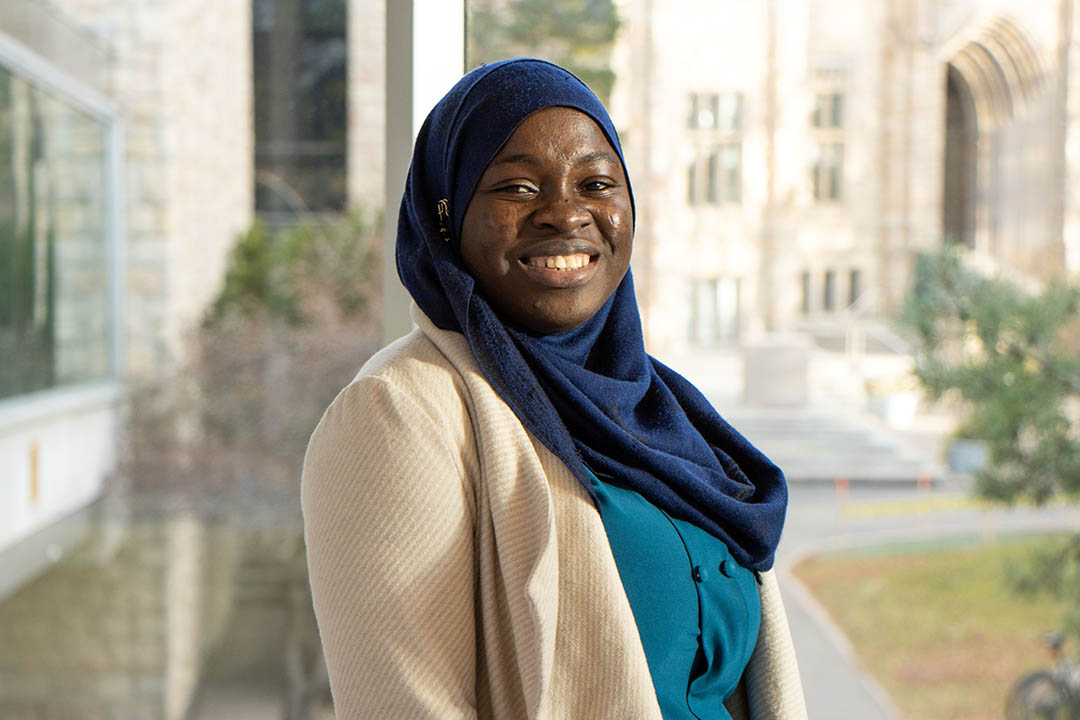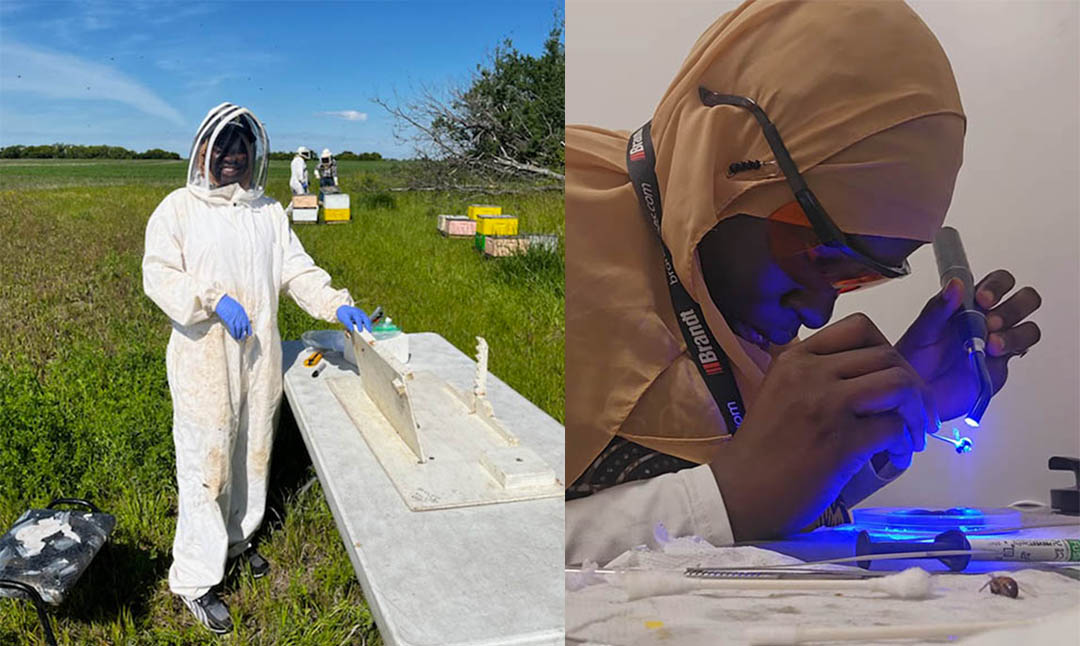
USask student masters the transition from Nigeria to Canada
Graduate student to receive Master of Science degree at USask Fall Convocation.
By Kristen McEwenIt was December when Basirat Liadi-Azeez arrived in Saskatoon to start her master’s degree at the University of Saskatchewan (USask) in 2022.
It was also about 60 degrees colder than her home in Nigeria.
Liadi-Azeez was looking forward to continuing her education but had to leave her husband and her young three-year-old girl behind. It would be eight months before they could join her in Saskatoon.
“It was a long time,” she said. “My child almost couldn’t recognize me. So, I would be talking on the phone, but she won’t even talk to me. It was hard.”
Liadi-Azeez was looking for opportunities after she earned her Bachelor of Science degree in zoology at the University of Ibadan in Oyo State, Nigeria.
“I was looking for opportunities outside of the country,” she said. “I was looking for labs with insects because those little things are really fascinating to work with.”
Liadi-Azeez applied to USask and found an opportunity to pursue a master’s degree in the Department of Biology under the supervision of biology professor Dr. Jack Gray (PhD).
She made the trip alone from Nigeria to Saskatoon in the middle of winter to a different country, and a different culture.
Gray connected Liadi-Azeez with another biology graduate student so she could rent a room. He picked her up from the airport and took her to get warmer clothes, to the grocery store, and helped her get settled.
“It’s a big cultural change,” Gray said. “I’ve had international students before (under my supervision), so I have some experience in how they adjust to coming to a pretty different place.”
Gray added that his laboratory has seen graduate students come from all over the world, including India, the Netherlands, and Nigeria.
“(International students) come to my lab not just to do the research,” he said. “Being a graduate student is much more than that. There’s a whole bunch of softer skills involved, but part of that is also getting into the culture of research—particularly North American, or Canadian culture of research.”
Liadi-Azeez is one of the brightest master’s students Gray has had in his lab, he said. She was receptive to ideas and feedback but would also offer her own thoughts and information.
“It was clear right from the start when she came into my lab that she could quickly grasp all the concepts and ideas. She had a really good, clear way of thinking about things.”
Though Liadi-Azeez had experience solely working with mosquitoes, she began to work with honeybees—the first master’s student to do so in the Gray Laboratory, which focuses on the neuroethology of insect flight.
She began studying honeybee behaviours—how environmental stressors, such as pesticides, can affect how bees see and navigate their environment.
“When we’re doing research ... we have to have deep knowledge about the animals we are working with,” she said.

Her thesis experiment involved setting up a virtual reality arena where bees experienced stimulus—black and white alternating stripes on the walls of the arena. As the bees would move, the stimulus moves in the opposite direction—much like what we see when we travel in a car, Liadi-Azeez explained.
“During the summer, I was working on the bee farm,” she said. “I was able to see how the bees are doing on the field, with respect to how they are doing in the lab.”
She pursued other volunteer opportunities at USask to build her self-esteem, confidence, and social skills. She served as treasurer for the Biology Graduate Students Association, volunteered at the USask Open House, and as a judge for an undergraduate seminar. Liadi-Azeez also earned a Professional Skills Certificate in 2024. That same year, she also had the opportunity to attend the 15th International Congress of Neuroethology in Berlin, Germany.
“All the skills, all the things I built over the years in Jack (Gray)’s lab, are coming into use now,” she said.
Liadi-Azeez is now a sessional lecturer for a third-year biology course on the fundamentals of animal physiology—the same course she took from her mentor, Gray.
“We have a good relationship,” she said. “He’s always been there. Even when I had my (second) baby, he came to the hospital. He’s one of the good things that has happened to me in Canada.”
Gray said that he will be on stage when Liadi-Azeez accepts her Master of Science degree in biology.
“I told her, I said, ‘You can expect when you walk across the stage, I’m going to give you a hug.’”
For other international students, or graduate students facing challenges, she shared a piece of advice.
“It might be hard right now, but it gets better,” she said. “As long as we are resilient, we have patience and we have confidence in ourselves, this is going to get better.
“When I was alone, that was what was keeping me going ... This is a phase that’s going to get better. It’s going to pass.”

